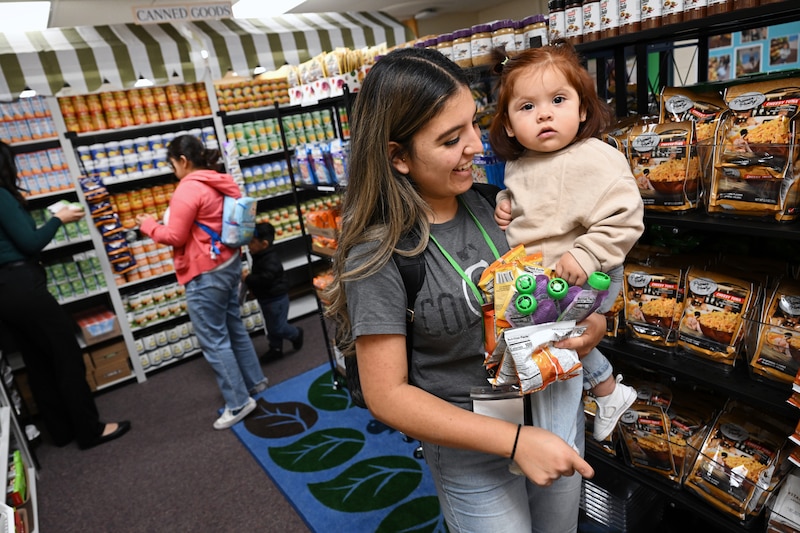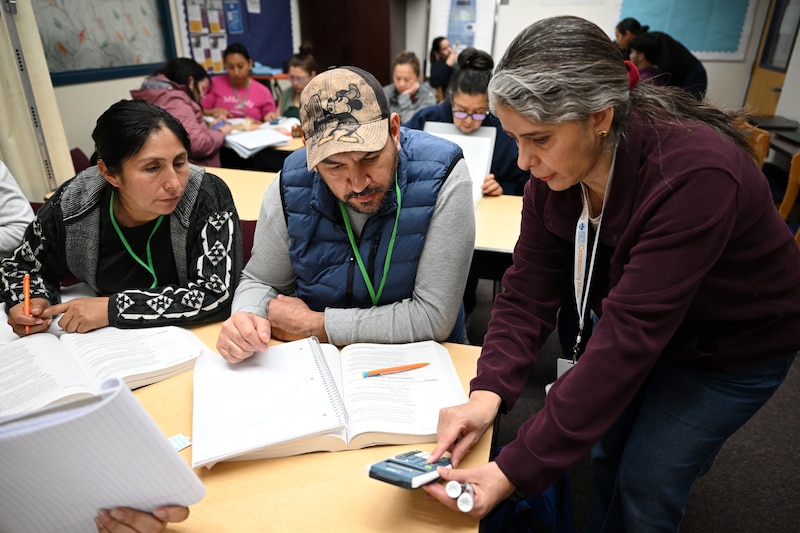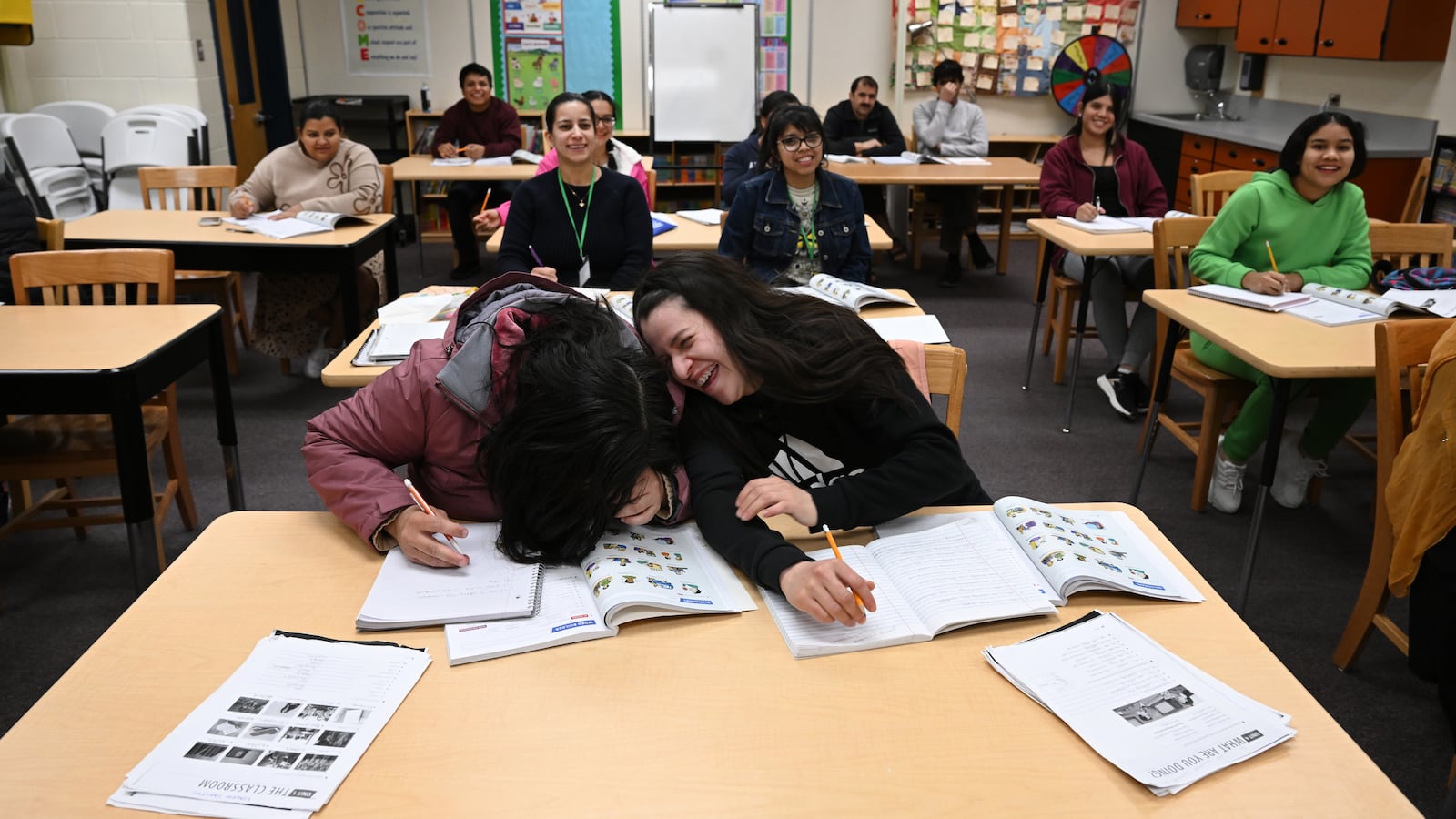Sign up for Chalkbeat Colorado’s free daily newsletter to get the latest reporting from us, plus curated news from other Colorado outlets, delivered to your inbox.
While her 5-year-old son attends kindergarten at west Denver’s Colfax Elementary School, Maelka attends class too. In a trailer near the playground, she and three other moms learn English.
On a recent Thursday, the group practiced letters and numbers by playing bingo.
“B eleven,” the teacher called out.
“Eleven! Eleven!” Maelka said. Then she translated the number into Spanish — “once,” pronounced on-say — for her classmates.
The trailer at Colfax Elementary is one of Denver Public Schools’ six “community hubs,” and the English language classes are among the most popular offerings. Launched in 2022 by Superintendent Alex Marrero, the community hubs were meant to take a two-generation approach to improving students’ lives by helping both children and parents with everything from food and clothing to financial counseling and mobile medical appointments.
Now, as more than 3,500 migrant students have enrolled in DPS since the beginning of the school year, the hubs are increasingly serving their families as they build new lives in Denver. The influx has stretched the hubs’ capacity, but district leaders said they remain committed to soliciting more donations and grant money to support the work.
“I need to learn English to understand, to work — and to learn, too,” Maelka said in Spanish. “It is important to know the language in the country where you are.”
Maelka and her family arrived in Denver from Venezuela in early December. After spending time in the city’s shelters, they found a house to rent near Colfax Elementary. Chalkbeat is withholding Maelka’s last name to protect her privacy.
The free classes do more than teach English, which offers the promise of higher-paying jobs. The hubs also foster a sense of community, said Manager Jackie Bell. On Maelka’s birthday, another mom baked her a cake and brought it to class.
The hubs are also a safety net. When one of the moms showed up to class in pain with a tooth infection, hub staff scrambled to connect her with a free dental clinic. When staff saw students were walking to school without warm jackets, the hub got a grant to buy brand new kid-sized puffy coats for students. When a grandmother who’s raising a grandson with autism told hub staff he would only eat one brand of rice, they were able to stock it in their mini market.
“That’s the message to our DPS parents that says, ‘We want you here,’” Bell said.

There’s ‘magic’ in the hubs’ differences
The community hubs are an expansion of a previous program called the Family and Community Engagement Centers, often shortened to FACE Centers. The hub at John H. Amesse Elementary in far northeast Denver was one of two original FACE Centers.
Marrero toured the center at John H. Amesse early in his superintendency. On her wall, Manager Carla Duarte has a framed map of the city on which Marrero scribbled his vision to have a similar center in every region of Denver. Now, two years later, the six hubs offer the same programming that the centers offered and more, depending in part on the hub’s space.
Two hubs have micro grocery stores with fresh produce and frozen meat, while others have food pantries stocked with dry and canned goods. All hubs distribute diapers, but some partner with a local nonprofit to give away car seats and strollers. At least one has a thrift store-sized used clothing boutique. Some are now partnering with Denver Health, which parks its mobile clinic on the curb and sees patients for half-hour appointments.
The hubs’ staffing differs, too. They all connect parents to programs that help pay their bills, but some have financial coaches and classes on household budgeting. Others help parents find jobs. The workforce development coordinator at the far northeast hub recently helped a migrant father who’d worked as a barber in Venezuela for 24 years get a job at a Denver barber shop.
When a hub doesn’t have a particular service, the staff refer families to one that does.
“That’s the magic of the community hubs,” Duarte said. “We’re all so different.”
The hub at John H. Amesse is among the biggest and busiest. Its spaces are sprinkled throughout the school in converted classrooms and once-empty offices.
On a recent Wednesday morning, adult Spanish-speaking students in a GED class were practicing math and celebrating with pink-frosted cupcakes a classmate who passed their tests.
In a small room off the library, two women rocked the babies of the GED students. One of the women, a refugee from Afghanistan with children in DPS, first came to the community hub seeking help paying her family’s rent. Through a translator who spoke Dari, the woman’s native language, Duarte said the woman asked an important question.
“She just looked at me and said, ‘Do you have any jobs for me?’” Duarte said.
Duarte was looking to fill a child care position, but she was unsure about the language barrier. Nearly all hub employees speak Spanish, but none spoke Dari. But DPS said yes, and the woman is now learning English through the hub’s classes — and picking up Spanish, too.
“She’s so amazing,” Duarte said. “It’s like the best thing we ever did.”
There’s a similar story across the hall, where a former participant leads a “play and learn” class for toddlers and their parents, who on this day were busy blowing soap bubbles with straws.
Many of the “play and learn” parents also attend GED or English classes at the hub. Ingrid Alemán had to stop because her 2-year-old son, Dylan, cried too much when he was separated from her in the child care room. But the mother and son still come to “play and learn.”
“He’s learning how to socialize with other kids,” Alemán said in Spanish. “And as a mom, it helps me to be with other moms who can give me advice. Because in the house —”
“You and the kids —” Duarte said.
“In the house, it’s crazy,” Alemán said, laughing.

Migrants are among the more than 4,000 families served
The hubs cost approximately $737,000 each to run, for a total yearly cost of about $4.4 million, according to Esmeralda De La Oliva, the district’s hubs director. When Marrero announced the initiative in 2022, he said the hubs would be partly funded with savings from cuts he made to the district’s central office as part of a reorganization.
In the past two years, the hubs have served more than 4,000 families, De La Oliva said. That includes more than 1,000 parents who are enrolled in adult education classes. In addition to GED and English language classes, some hubs offer classes to help parents pass citizenship tests and classes that teach Spanish to English-speaking parents.
About 350 newly arrived adults are enrolled in the classes and the hubs have served 600 migrant families this year, De La Oliva said. The GED classes are at capacity, and De La Oliva said she’s seeking more funding for the GED and English language classes, mini markets, and food pantries from private donors and nonprofit organizations including the Denver Public Schools Foundation’s newly launched New Arrivals, Students & Family Fund.
The work of serving migrant families, many of whom have harrowing stories, can weigh on the hearts and minds of hub staff, De La Oliva said, which is why the district plans to offer intensive self-care training for staff starting next month. But the work is making a difference.
De La Oliva recalled a family who came into a hub this school year looking for diapers three weeks after arriving from Colombia. Within a month, the mom was enrolled in GED and English language classes. Within two months, the dad was working for the DPS transportation department, which has been notoriously short-staffed.
The hub at Swansea Elementary in north Denver is a 15-minute walk from the Western Motor Inn, which has served as an unofficial shelter for hundreds of migrants. As of a month ago, Swansea had enrolled more than 50 migrant students — and the hub was serving their families and others who heard about it through word of mouth, Manager Sandra Carrillo said.
People would walk through the hub door, sometimes in groups of six or more family members, Carrillo said. “They were like, ‘We just arrived today.’” Hub staff jumped in, providing everything from socks and underwear to help enrolling families’ 4-year-olds in Colorado’s new free preschool program.
Among the new arrivals at the Swansea hub was a 27-year-old man who is blind, Carrillo said. He doesn’t have any documentation from Venezuela that he’s legally blind. That has led to roadblocks in getting services such as RTD’s Access-a-Ride, which provides transportation to riders with disabilities. But the hub is doing its best to clear those roadblocks for its own offerings.
The man’s goal is to eventually study economics and computer science at a university, Carrillo said. He enrolled in the hub’s English classes but all of the materials were on paper. Carrillo said the hubs’ higher-ups were quick to approve the hub working with a local nonprofit to get the man the software he needs to participate in the classes.
“When families let us know they’re going through something, it’s working with everyone in the community to see who has resources,” Carrillo said.
While the work can be complicated, the goal is not.
As Carrillo noted, “Happier families, happier students.”
Melanie Asmar is the bureau chief for Chalkbeat Colorado. Contact Melanie at masmar@chalkbeat.org.
